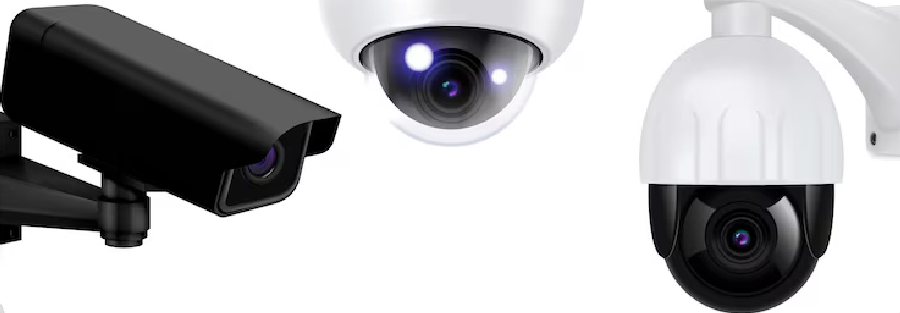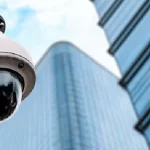In today’s rapidly evolving world, security has become a critical aspect for industries, businesses, and homes alike. Whether it is CCTV for restaurants ensuring compliance with hygiene standards or surveillance systems in large warehouses, the choice of the right CCTV camera types can significantly enhance security and operational efficiency.
Why Understanding CCTV Camera Types Matters
Selecting from the different types of CCTV cameras is not merely about installing a security system; it is about ensuring the safety of people, protecting valuable assets, and enhancing productivity across industries. Whether it’s tracking employee activities or preventing unauthorized access, modern CCTV camera features cater to diverse needs. In this article, we will explore the types of CCTV systems available and their applications across industries.
Key Types of CCTV Cameras
1. Dome Cameras
Named after their dome-shaped structure, these cameras are highly versatile and can be used indoors and outdoors. Dome cameras provide 360-degree coverage, making them ideal for monitoring large areas like warehouses, retail stores, or factories.
- Features: Night vision, vandal resistance, and 360-degree rotation.
- Use Cases: Monitoring customer behavior in retail, ensuring workplace safety in industrial setups.
2. Bullet Cameras
Bullet cameras are cylindrical and are often used for long-range surveillance. These are typically installed outdoors due to their weatherproof design.
- Features: High resolution, infrared night vision, and zoom capabilities.
- Use Cases: Monitoring parking lots, securing warehouse perimeters, and tracking vehicle movement.
3. PTZ Cameras (Pan-Tilt-Zoom)
These cameras are ideal for areas requiring live monitoring. Operators can control their pan, tilt, and zoom features remotely.
- Features: High-resolution imaging, zooming capabilities, and flexibility.
- Use Cases: Surveillance in large warehouses or public spaces, as they can track moving objects effectively.
4. Thermal Cameras
Thermal imaging cameras detect heat signatures, making them perfect for areas where visibility is a challenge.
- Features: Heat detection, ability to function in complete darkness.
- Use Cases: Monitoring sensitive areas like cold storage warehouses or high-security zones.
These CCTV camera types cater to specific industrial needs, ensuring maximum security and operational benefits.
Applications Across Industries
1. Retail Stores
Retail businesses can benefit greatly from installing the right types of CCTV cameras. Cameras like Dome and PTZ are excellent for monitoring customer movement, preventing theft, and optimizing layouts. If you’re exploring solutions for retail, consider linking to CCTV for retail store solutions.
2. Warehouses
Warehouses often house valuable goods and are prone to theft and operational inefficiencies. Installing all types of CCTV cameras such as bullet and thermal cameras can ensure complete surveillance of inventory and perimeter security.
3. Restaurants
Hygiene and safety are paramount in restaurants. Advanced CCTV camera features like high-definition video recording and remote monitoring ensure compliance with SOPs and help address disputes. For more insights, explore CCTV for restaurant systems.
4. Industrial Premises
Industrial facilities with high-value equipment benefit from cameras with features like thermal imaging and PTZ for monitoring operations and preventing intrusions.
Key Features to Look For
When selecting the right CCTV system, evaluating CCTV camera features can save costs and ensure optimal performance.
- High-Resolution Imaging: Essential for identifying faces or license plates.
- Night Vision: Crucial for 24/7 surveillance.
- Remote Monitoring: Enabled through smartphone apps or centralized dashboards.
- Video Analytics: Provides insights like motion detection and alerts.
- Weatherproof Design: Important for outdoor cameras.
Each of these features enhances the functionality and reliability of all types of CCTV cameras, making them suitable for varied industry needs.
Benefits of Choosing the Right CCTV Cameras
- Enhanced Security: Reduces risks of theft and unauthorized access.
- Improved Productivity: Ensures employee compliance with SOPs.
- Cost Savings: Modern cameras eliminate the need for excessive man-guarding.
- Operational Insights: Advanced analytics provide actionable data.
Conclusion
The different types of CCTV cameras available today cater to a wide range of needs, ensuring that businesses across industries can secure their operations effectively. With an understanding of CCTV camera types, features, and applications, organizations can make informed decisions that lead to better security, compliance, and efficiency.
For more detailed CCTV camera information or industry-specific solutions, reach out to experts who can guide you through the best options for your business.



